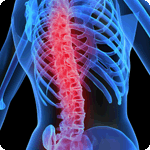
|
Causes of Sciatica
As mentioned above, sciatica is caused when there is pressure or damage to the sciatic nerve. This can be instigated from a traumatic injury, such as from a car accident, or from other medical conditions that affect the back and spine, such as herniated disk. Sciatica may also be caused by pregnancy, and risk factors include being overweight, lack of exercise, wearing high heels, or sleeping on soft surfaces.
Sciatica Symptoms
Various symptoms may affect a person with sciatica. The primary symptom is pain down one side of the lower body, especially in the leg. The pain can feel like a mild tingle, a dull ache, or a burning sensation. In cases of severe pain the patient may have trouble moving. Pain may increase after standing or sitting for long periods of time, or even from sneezing and laughing. Another symptom of sciatica is numbness in the back of the leg or on the bottom of the foot.
Treatment for Sciatica
As with any injury, your doctor will be the best source of advice on the appropriate treatment method for your situation. As mentioned, sciatica is actually a symptom of other medical disorders that affect the sciatic nerve. Your physician will perform a physical examination to determine the cause of your sciatica back pain. Mild cases of sciatica often go away on their own with time and reduced activity. To help alleviate back pain, your doctor may suggest using hot or cold therapy and anti-inflammatory medications such as ibuprofen and aspirin. After two to three weeks of rest, physical therapy may be recommended to increase strength and flexibility in the spine.If conservative treatment does not improve your condition, your doctor may recommend steroid injections to reduce the pain. You may also be referred to a neurologist or a pain specialist for best treatment of your sciatica pain. As mentioned above, sciatica often goes away on its own, but it is also common for sciatica to return. |
Related Articles
|










